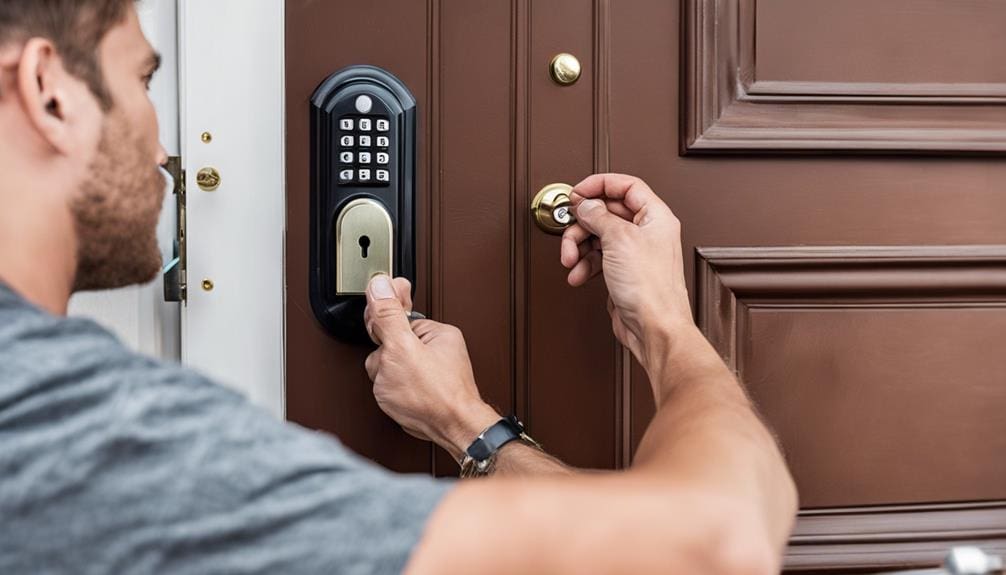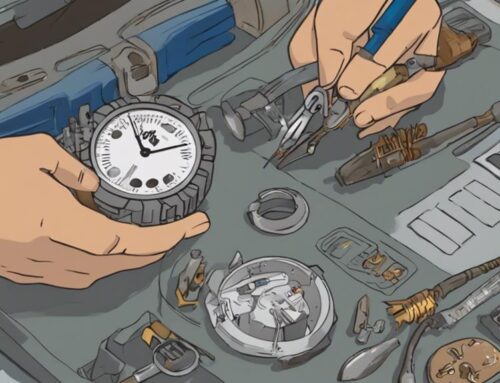Avoid future lockouts by taking several preventive measures. First, duplicate your keys and give them to trusted individuals. Secure duplicates in discreet, accessible locations. Consider upgrading to smart locks or keyless entry systems for added convenience and remote access. Regularly maintain your locks by applying lubricants and inspecting for damage. If you keep a spare key, place it in a secure lock box or with a trusted neighbor. Finally, keep the contact information of a reliable emergency locksmith on hand. These tips, when combined, offer all-encompassing protection from unforeseen lockouts. For further detailed strategies, there’s more available.
Key Takeaways
- Duplicate keys and distribute them to trusted individuals for backup access.
- Install smart locks to manage entry remotely and receive tamper alerts.
- Use keyless entry systems with biometric scans or temporary codes for enhanced security.
- Regularly maintain locks by lubricating annually and inspecting for damage.
- Store spare keys in secure locations like a key lock box or with a trusted neighbor.
Duplicate Your Keys
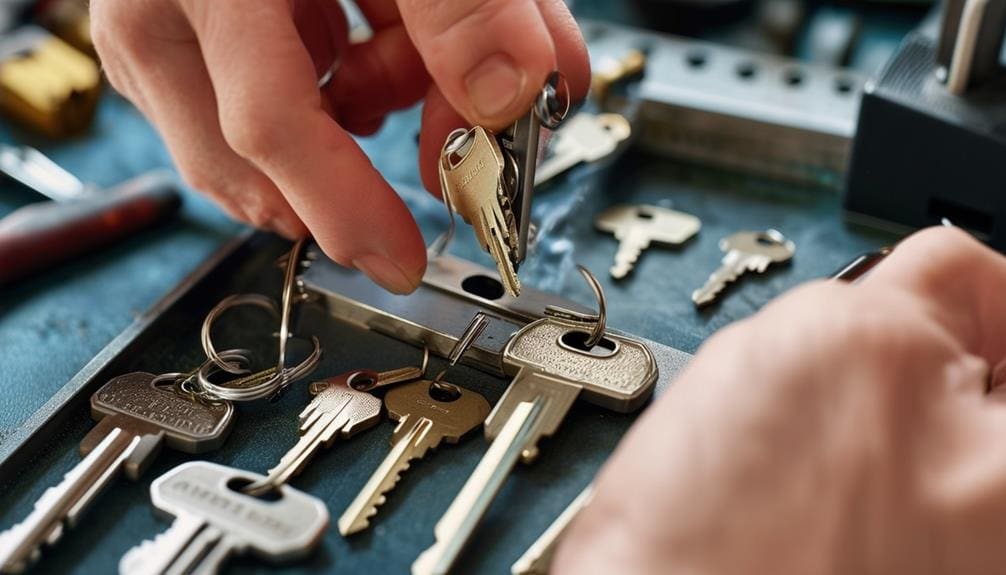
One of the simplest yet most effective security measures you can take is to duplicate your keys and distribute them to trusted individuals. This proactive approach guarantees that you have multiple access points in case of a lockout, minimizing downtime and stress. Start by identifying those you truly trust, such as family members or close friends, and provide them with a spare key. This allows for a safety net that’s both reliable and immediate.
When duplicating keys, always use a reputable locksmith. High-quality duplicates guarantee that the keys fit perfectly and reduce the chance of malfunction. Low-quality duplicates can wear out your locks quicker, leading to costly repairs. Additionally, consider labeling the duplicates discreetly to avoid confusion.
Store one duplicate in a secure, yet accessible location within your property, like a lockbox. This gives you controlled access, especially in emergencies. Always keep a record of who has each duplicate key to maintain control over your security. Regularly review and update this list to guarantee it remains accurate.
Install Smart Locks
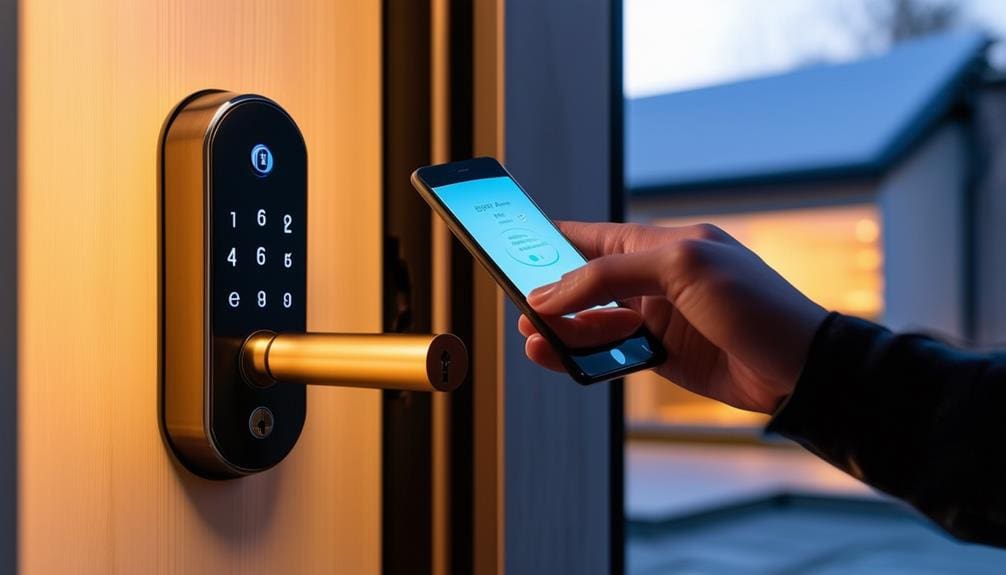
Installing smart locks offers you enhanced security features and the convenience of keyless entry. These devices allow remote access control and real-time monitoring, ensuring your property stays secure. Plus, you won’t have to worry about losing or duplicating physical keys.
Enhanced Security Features
Upgrading to smart locks greatly enhances your home’s security by providing remote access control and real-time monitoring capabilities. Smart locks allow you to manage who enters your home and when, ensuring you have complete control over your security system.
With smart locks, you can benefit from:
- Remote Access Control: Whether you’re at work or on vacation, you can lock or open your doors from anywhere using your smartphone.
- Real-Time Monitoring: Receive instant notifications whenever someone enters or exits, allowing you to stay informed about all activity at your front door.
- Tamper Alerts: Get alerted immediately if someone attempts to tamper with your lock, giving you the power to take swift action.
Implementing these enhanced security features means you’re not just upgrading your locks; you’re upgrading your peace of mind. Smart locks often integrate seamlessly with other home automation systems, providing a unified security approach. They also come with robust encryption protocols to protect against hacking attempts, ensuring your home remains a fortress.
Keyless Entry Convenience
With keyless entry systems, you can effortlessly enhance your home’s security and convenience by eliminating the need for physical keys. By installing smart locks, you gain control over access to your property using advanced technology. These systems often include features like biometric recognition, PIN codes, and smartphone integration, giving you multiple ways to open your doors without fumbling for keys.
To set up a smart lock, first, choose a model compatible with your existing door hardware. Many smart locks are designed for easy DIY installation, but professional installation ensures maximum functionality. Once installed, configure the lock through its accompanying app, which typically involves setting up user profiles and access codes. Some models even offer temporary or scheduled access, perfect for granting entry to guests or service providers without compromising security.
You’ll also appreciate the audit trail feature available in many smart locks. This function logs every entry and exit, providing a detailed record of who accessed your home and when. Regularly update your lock’s software to protect against potential vulnerabilities. By leveraging the power of smart locks, you not only avoid future lockouts but also strengthen your home’s security with cutting-edge technology.
Use Keyless Entry
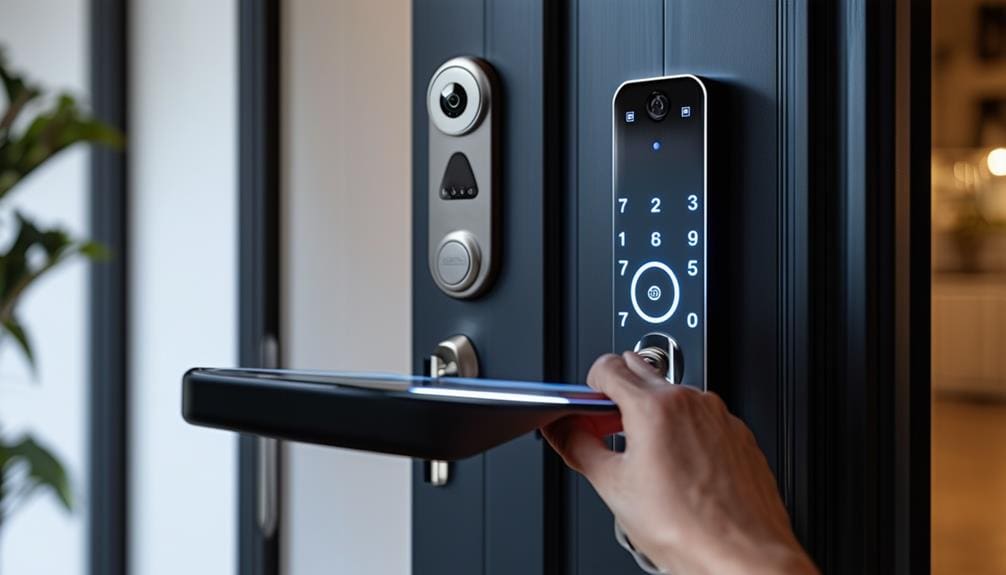
Keyless entry systems offer a secure and convenient alternative to traditional lock-and-key mechanisms. By leveraging advanced technology, you can eliminate the risk of losing your keys or getting locked out. These systems provide not just ease but also an added layer of security that traditional locks can’t match. Here’s why you should consider upgrading:
- Enhanced Security: Keyless systems often include features like biometric scans and encrypted access codes, making unauthorized entry notably more difficult.
- Convenience: With keyless entry, you can grant access remotely, allowing trusted individuals entry without needing physical keys.
- Customization: Many keyless systems let you set temporary codes or access schedules, giving you control over who enters and when.
As someone who values power and efficiency, investing in a keyless entry system means you’re always in control. You won’t need to worry about copying keys or dealing with lockouts. Instead, you’ll have a reliable, high-tech solution tailored to your needs. Choose a reputable brand, and ensure it supports the security protocols you require. Installation is straightforward, and the long-term benefits far exceed the initial investment. Take command of your security and enjoy peace of mind with keyless entry.
Regular Lock Maintenance
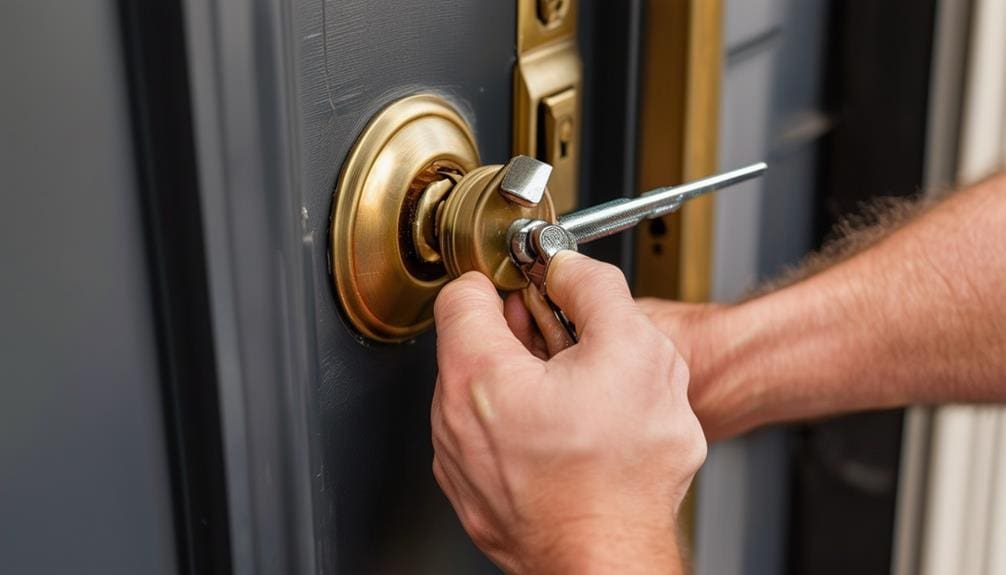
To guarantee your locks function smoothly, apply lubricant annually to keep the internal mechanisms from seizing. Regularly inspect your locks for signs of wear or damage, which can compromise security. By maintaining your locks, you’ll extend their lifespan and improve home safety.
Lubricate Locks Annually
Annual oiling of your locks safeguards they function smoothly and resist wear. It’s a simple yet powerful step you can take to extend the life of your locking mechanisms and make sure you’re never caught off guard by a stubborn lock. Using a high-quality lubricant designed specifically for locks will minimize friction and prevent internal components from grinding against each other.
Here’s how you can effectively oil your locks:
- Choose the right lubricant: Opt for a silicone-based or graphite lubricant. These types are less likely to attract dust and dirt.
- Apply the lubricant properly: Insert the nozzle into the keyway and apply a short burst. Then, insert and turn the key several times to distribute the lubricant evenly.
- Clean up excess residue: Wipe away any extra lubricant from the exterior of the lock to avoid attracting dirt.
Inspect for Wear
After confirming your locks are well-lubricated, it’s equally important to regularly inspect them for signs of wear and tear. Begin by examining the lock’s exterior for any visible damage or rust. These can compromise the structural integrity of the lock, making it easier to break or jam. Use a flashlight to inspect the keyway for any debris or obstructions that could impede the lock’s function.
Next, insert your key and turn it several times to check for smooth operation. If you notice any resistance, it could indicate internal wear or misalignment. In such cases, disassemble the lock if you’re comfortable, or consider calling a professional locksmith to inspect and repair it. Pay close attention to the strike plate and latch on your doorframe; these components must be tightly secured and show no signs of damage.
Don’t overlook the screws and mounting hardware. Loose screws can lead to misalignment, making the lock ineffective. Tighten any loose screws and replace any that are rusted or damaged. Regular maintenance, combined with these inspections, will guarantee that your locks remain reliable and secure, preventing future lockouts effectively.
Keep Spare Keys Handy
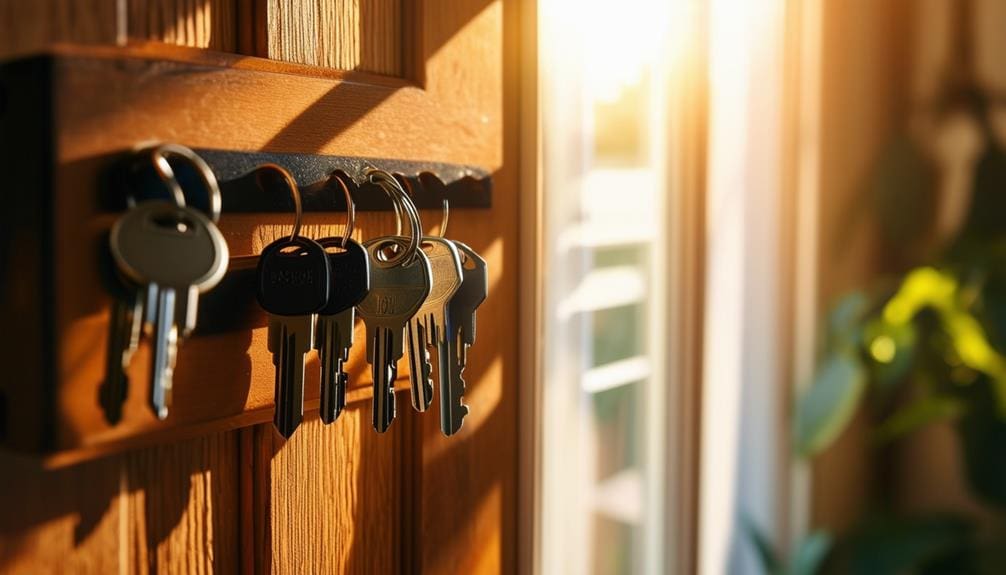
Always keep a set of spare keys in a secure yet easily accessible location to prevent lockouts and ensure quick access in emergencies. This simple step helps you maintain control over your access points without compromising security. Consider these practical options for storing spare keys:
- Trusted Neighbor or Family Member: Entrust a reliable person with your spare key. This provides you with a human backup system, guaranteeing someone you trust can help when needed.
- Key Lock Box: Install a sturdy, combination-protected lock box outside your home. These devices are designed to withstand tampering and provide you with immediate access to your spare key.
- Secure Workplace Storage: If you spend a significant amount of time at work, storing a spare key in a locked drawer or safe can be a practical solution.
When choosing where to keep your spare keys, prioritize both security and accessibility. Avoid common hiding spots like under the doormat or above the door frame, as these are the first places intruders check. Instead, opt for less obvious, more secure locations. By proactively managing your spare keys, you minimize the risk of lockouts and maintain control over your property access.
Emergency Locksmith Services

When you find yourself locked out of your home or car, emergency locksmith services provide the swift assistance needed to regain access without damaging your locks. These professionals are trained to handle a variety of lockout scenarios, guaranteeing minimal disruption to your day. Utilizing advanced tools and techniques, they can quickly and efficiently open doors, safes, and even high-security systems.
Here’s a comparison to help you understand the advantages of emergency locksmith services:
| Feature | DIY Lock Picking | Emergency Locksmith | Advantage |
|---|---|---|---|
| Time Efficiency | Often time-consuming | Rapid response | Saves valuable time |
| Risk of Damage | High | Minimal | Protects your property |
| Skill Requirement | Requires significant skill | Professional expertise | Ensures successful entry |
| Cost | Low initial cost | Variable | Long-term cost-effectiveness |
Emergency locksmith services offer a powerful solution when you need immediate access. They provide 24/7 availability, meaning you’re never left stranded. Additionally, these experts not only open doors but can also rekey or replace locks if needed, enhancing your security. By relying on their expertise, you guarantee that your lockout situation is resolved quickly and effectively, leaving you in control and ready to tackle your next challenge.
Frequently Asked Questions
Can a Locksmith Help if I Lock Myself Out of My Car?
Absolutely, a locksmith can help if you gain access yourself out of your car. They’ll use specialized tools and techniques to access your vehicle without causing damage, getting you back on the road swiftly and efficiently.
Are There Any Security Risks Associated With Using Digital Locks?
Yes, digital locks do have security risks. They’re vulnerable to hacking, power outages, and software malfunctions. To mitigate these risks, you should regularly update firmware, use strong passwords, and consider a backup mechanical lock.
What Should I Look for When Choosing a Locksmith Service?
When selecting a locksmith service, prioritize their certification, experience, and customer reviews. Guarantee they offer 24/7 availability and transparent pricing. Don’t compromise; choose a locksmith with advanced tools and techniques for superior security solutions.
How Often Should I Change My Home’s Locks?
You should change your home’s locks every few years or immediately after losing keys, moving into a new place, or experiencing a break-in. Regular updates guarantee maximum security and control over who has access.
Can Weather Conditions Affect the Functionality of My Locks?
Yes, weather conditions can affect your lock’s functionality. Extreme cold can cause locks to freeze, while humidity can cause rust and stiffness. Regular maintenance like lubrication and weatherproofing guarantees your locks remain reliable and functional.
Conclusion
Imagine the sinking feeling of standing outside your door, locked out in the pouring rain. To prevent that scenario, duplicate your keys, install smart locks, and use keyless entry. Maintain your locks regularly and keep spare keys in safe, accessible places. And if all else fails, have an emergency locksmith on speed dial. By taking these practical steps, you’ll keep that unwelcome, soggy moment at bay and guarantee smooth, stress-free access to your home.

